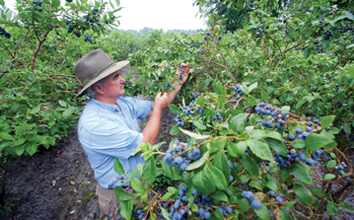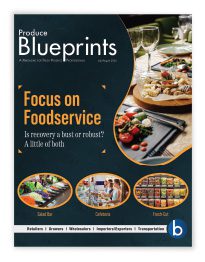Beyond weather challenges, there is one consumer preference that’s not always easy to satisfy. “Customers are concerned about chemicals even though they’re cleared by the EPA (U.S. Environmental Protection Agency),” Sheppard observes. “Some chemicals do have viable alternatives; some don’t—and we have to plead our case to use them.” He cites the asparagus beetle as an example: the insect degrades the quality of the crop, rendering it unsalable, unless conventional pesticides are carefully applied.
Retail Scene
The increasing popularity of locally grown fruits and vegetables is frequently cited as having the biggest impact on the state’s produce industry within the last year or two. “Jersey Fresh is a great tool in marketing,” observes Ron Budd, vice president of Gloucester County Packing Company in Woodbury. “Regional chain stores get behind locally grown and the Jersey Fresh label.”Bill Nardelli, Sr., president of Nardelli Brothers, Inc., agrees: “Retailers are trending toward locally grown, and that’s extremely important to us. We have 80 commodities, and supply numerous out-of-state metropolitan areas with fresh, overnight deliveries.”
The retail scene, while highly supportive of the state’s branding programs, has also become crowded. “It’s highly competitive; consumers have a lot of choices of where to shop,” comments Budd. “For the big box stores we have Walmart, Shop Rite, ACME, Pathmark, and Wegmans, to name a few. And everybody wants the same thing—the best possible product for the least amount of money.”
Budd uses a couple of critical strategies to compete in this arena. For starters, he observes that retailers want one-stop shopping. “This has forced us to carry a full line of potatoes and pack sizes.” Secondly, “Just-in-time deliveries are a competitive edge,” he states. “What used to be called warehouses are now called distribution centers. Our customers don’t want to tie up money in inventory or in storage space; we’ve had to adapt to their needs.”
John Molinelli, president of the eponymous John Molinelli, Inc., agrees that times are changing. “Retailers are demanding a lot, they want more structured marketing to lock in on a set price for a week or two,” he explains. “You really have to know the markets and the supply in order to do this. It’s challenging, but we try to give them what they want.”
And while many supermarkets tend to be loyal to local produce, Thomas Sheppard, president of Eastern Fresh Growers, notes, “I would love to have this be even more of the case,” he asserts, recalling one chain opting to ship in asparagus rather than sourcing from local, in-season product.
While the latest food safety recommendations are not mandatory yet, Sheppard sees compliance as essential. He notes that even if he does not sell directly to a vendor, his business is still subject to an audit by that vendor. “It is a selling point if you’ve already complied,” he notes. “If you’re compliant, then you gain a new customer. In a sense, you’re getting paid for the audit, which is expensive. But at some point, everyone will have to do it, and the cost of the audits will be pushed onto the consumer.”



